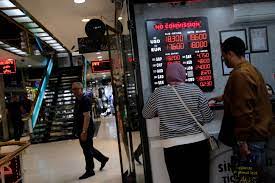ANKARA (Reuters): Turkey’s lira gained and stocks wobbled on Monday after the political opposition logged a thumping victory over President Tayyip Erdogan’s AK Party (AKP) in local elections.
Analysts said Turkey’s near 70% inflation rate, slowing economic growth and an aggressive monetary tightening campaign that has jacked up borrowing costs had hurt the AKP result on Sunday. Erdogan has stood by the tightening despite the high-stakes vote.
The lira firmed to below 32 to the dollar after having earlier dipped to 33, a new record low, in thin overnight trade.
Many foreign financial markets were closed on Monday for the Easter holiday.
The benchmark stock index BIST 100 opened up more than 1% with banking shares up 1.7%. At 1329 GMT, the indexes were up 0.26% and 1.72% respectively, having fallen earlier by as much as 1.8%.
Turkey’s five-year credit default swaps, a measure of investment risk, was little changed at 306 basis points, while bond yields dipped slightly with Turkey’s international sovereign bonds marginally up in price.
The premium demanded by investors to hold Turkey hard-currency bonds over safe-haven U.S. Treasuries tightened 4 basis points to 293 basis points, according to JPMorgan data.
The nationwide results in Sunday’s vote marked the biggest electoral blow for Erdogan and his AKP in more than two decades in power, reaffirming the opposition as a force and reinforcing Istanbul Mayor Ekrem Imamoglu as the president’s chief rival.
The S&P 500 posted its strongest first-quarter performance in five years on Thursday despite U.S. stocks closing little-changed.
Finance Minister Mehmet Simsek said on Monday that Turkey would continue to implement its medium-term economic programme decisively with a major focus on reducing inflation and achieving sustainable growth.
Goldman Sachs said markets would likely welcome the fact that Erdogan’s government has not disputed the outcome of the municipal elections and that it has recommitted to the current economic policy.
“Just maintaining current policies, which we expect to be the case, should in our view support capital flows in the coming weeks and with the current account having structurally corrected sharply and seasonally going to improve, we think the lira should be much better supported than in recent months,” said Clemens Grafe, co-head of CEEMEA Economics at Goldman Sachs, in a note.
Tellimer Insights said that if Erdogan’s defeat was linked to the high inflation “and the only way to address this is to stay the course on orthodox policy, then President Erdogan is likely to continue backing his technocratic economic policy team”.
However, Tellimer analyst Hasnian Malik said the medium-term risk of a return to populist policies had increased.







